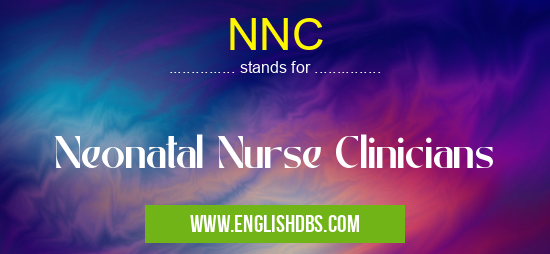What does NNC mean in MEDICAL
Neonatal Nurse Clinicians (NNCs) are advanced practice registered nurses (APRNs) who specialize in the care of critically ill newborns and infants. They provide comprehensive, evidence-based care to infants from birth to 28 days of life, addressing a wide range of acute and chronic conditions.

NNC meaning in Medical in Medical
NNC mostly used in an acronym Medical in Category Medical that means Neonatal Nurse Clinicians
Shorthand: NNC,
Full Form: Neonatal Nurse Clinicians
For more information of "Neonatal Nurse Clinicians", see the section below.
NNC: Meaning and Scope of Practice
NNC stands for Neonatal Nurse Clinician. These APRNs have a master's or doctorate degree in nursing and have undergone specialized training in neonatology. They possess advanced knowledge and skills in neonatal physiology, pathophysiology, pharmacology, and nursing interventions.
NNCs work in a variety of settings, including neonatal intensive care units (NICUs), well-baby nurseries, and pediatric clinics. They provide primary, secondary, and tertiary care to newborns and infants, including:
- Assessment and diagnosis: NNCs conduct thorough physical exams, interpret laboratory data, and perform diagnostic tests to identify and manage medical conditions.
- Treatment and management: They administer medications, provide respiratory support, monitor vital signs, and implement evidence-based nursing interventions to stabilize and improve the health of infants.
- Family education and support: NNCs provide comprehensive education and support to parents and families on infant care, feeding, and developmental milestones.
- Collaboration and care coordination: They collaborate with other healthcare providers, including physicians, respiratory therapists, and social workers, to ensure coordinated and seamless care for their patients.
Essential Questions and Answers on Neonatal Nurse Clinicians in "MEDICAL»MEDICAL"
What is a Neonatal Nurse Clinician (NNC)?
An NNC is a registered nurse (RN) with advanced education who specializes in caring for critically ill and premature newborns in neonatal intensive care units (NICUs).
What are the responsibilities of an NNC?
NNCs provide comprehensive care to newborns, including:
- Assessing and monitoring vital signs and overall health
- Administering medications and treatments
- Providing respiratory support and other life-saving interventions
- Supporting families and providing emotional support
What is the education and training required to become an NNC?
To become an NNC, individuals must:
- Earn a Bachelor of Science in Nursing (BSN) from an accredited nursing program
- Pass the National Council Licensure Examination for Registered Nurses (NCLEX-RN)
- Complete a Master of Science in Nursing (MSN) or Doctor of Nursing Practice (DNP) program with a focus on neonatal care
- Obtain certification from the National Certification Corporation for NNCs (NCC)
What are the career opportunities for NNCs?
NNCs are in high demand in NICUs and other healthcare settings. They can work as:
- Neonatal nurse clinicians
- Nurse managers
- Nurse educators
- Researchers
What are the benefits of working as an NNC?
Working as an NNC offers many benefits, including:
- Job security due to high demand
- Competitive salaries
- Opportunities for professional growth and advancement
- The ability to make a significant impact on the lives of newborns and their families
Final Words: NNCs play a vital role in the care of critically ill newborns and infants. Their advanced training and expertise enable them to provide high-quality, compassionate care, improving outcomes and supporting the well-being of these vulnerable patients.
NNC also stands for: |
|
| All stands for NNC |
